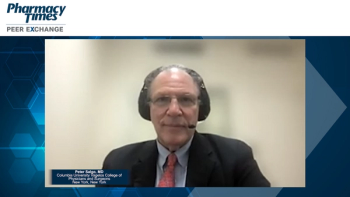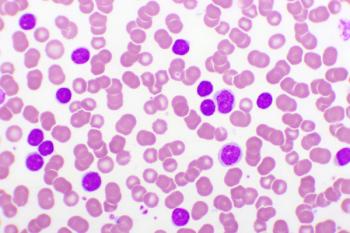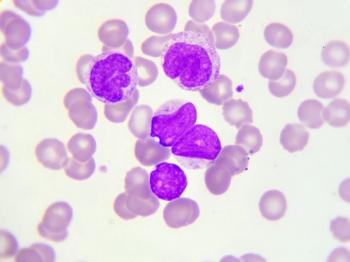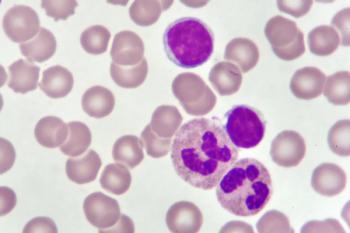
Andrew Mulcahy, PhD, a senior policy researcher at RAND Corporation, discusses a recent report that showed the drug shortages in the United States may not be associated with problems in the global supply chain.

Andrew Mulcahy, PhD, a senior policy researcher at RAND Corporation, discusses a recent report that showed the drug shortages in the United States may not be associated with problems in the global supply chain.

Laura Lee Hall, PhD, president of the Center for Sustainable Health Care Quality and Equity (SHC), addresses how the diabetes DRIVE program compares with the SHC DRIVE models for flu and COVID-19 vaccinations.

Laura Lee Hall, PhD, president of the Center for Sustainable Health Care Quality and Equity (SHC), addresses what the SHC’s diabetes DRIVE toolkit is and how it helps to address disparities in diabetes disease burden and health outcomes.

Sarah Temkin, MD, of the Office of Research on Women’s Health (ORWH) at the National Institutes of Health (NIH), discusses how the NIH ORWH has helped to advance clinical research on biological and sociological variables.

Luciano Costa, MD, PhD, of the University of Alabama at Birmingham, discusses the adverse events experienced by patients with newly diagnosed multiple myeloma who were administered daratumumab, carfilzomib, lenalidomide, and dexamethasone.

David Olson, PhD, the chief innovation officer, head of scientific advisory board, and co-founder of delix therapeutics and an associate professor at University of California, Davis, discusses psychedelics and other psychoplastogens in the treatment of brain and mental health disorders.

Jacob D. Soumerai, MD, of Harvard Medical School and Massachusetts General Hospital, discusses next steps in the research assessing zanubrutinib, obinutuzumab, and venetoclax in the treatment of previously untreated chronic lymphocytic leukemia.

Dr Jason Gallagher explains how COVID-19 booster shots affect herd immunity in the United States.

A panel of experts gives an overview on the purpose of COVID-19 booster shots and their critical importance to population health.

What pharmacists need to know about the adoption of novel targeted therapies for Waldenstrom macroglobulinemia into regular clinical practice.

The criteria used by hematologists and oncologists to guide decisions to initiate therapy for Waldenstrom macroglobulinemia vs monitor patients with active surveillance.

Ronald T. Piervincenzi, PhD, CEO of US Pharmacopeia, explains how pharmacists and USP came together in 2021 to work harder than ever before, as well as what can be done now to prepare for the next health crisis.

Luciano Costa, MD, PhD, of the University of Alabama at Birmingham, discusses the results for all of the trial endpoints assessing daratumumab, carfilzomib, lenalidomide, and dexamethasone for patients with newly diagnosed multiple myeloma.

Jacob D. Soumerai, MD, of Harvard Medical School and Massachusetts General Hospital, discusses trial results showing the safety and efficacy of zanubrutinib, obinutuzumab, and venetoclax in the treatment of previously untreated chronic lymphocytic leukemia.

Holistic wellness and helping patients manage the toxins in their outside life are just a few of the focuses at Wobbly Arrow Wellness.

Ronald T. Piervincenzi, PhD, CEO of US Pharmacopeia, discusses the challenges that lie ahead as we move into the third year of the COVID-19 pandemic, as well as other major developments on the horizon for pharmacists in 2022.

Luciano Costa, MD, PhD, of the University of Alabama at Birmingham, discusses the primary endpoint in the trial assessing daratumumab, carfilzomib, lenalidomide, and dexamethasone in the treatment of patients with newly diagnosed multiple myeloma.

Jacob D. Soumerai, MD, of Harvard Medical School and Massachusetts General Hospital, discusses the adverse events experienced by patients with previously untreated chronic lymphocytic leukemia when treated with zanubrutinib, obinutuzumab, and venetoclax.

Ronald T. Piervincenzi, PhD, CEO of US Pharmacopeia, discusses what stands out as the biggest challenge from the past year and what role USP and pharmacists had in overcoming that challenge.

Luciano Costa, MD, PhD, associate director for clinical research at the O’Neal Comprehensive Cancer Center at the University of Alabama at Birmingham, on the safety and efficacy of Dara-KRd in the treatment of patients with newly diagnosed multiple myeloma.

Jacob D. Soumerai, MD, of Harvard Medical School and Massachusetts General Hospital, addresses the primary endpoint in the trial assessing zanubrutinib, obinutuzumab, and venetoclax in previously untreated chronic lymphocytic leukemia.

Sarah Temkin, MD, associate director for clinical research in the Office of Research on Women’s Health (ORWH) at the National Institutes of Health (NIH), discusses how the work of the NIH ORWH impacts pharmacy practice.

The panel considers optimal therapy for recurrent CDI, particularly the role of fecal microbiota transplantation.

Centering their discussion around a patient case of CDI, experts discuss optimal therapy selection given available agents and guidelines.

Jacob D. Soumerai, MD, of Harvard Medical School and Massachusetts General Hospital, discusses minimum residual disease-driven time limited therapy with zanubrutinib, obinutuzumab, and venetoclax in previously untreated chronic lymphocytic leukemia.

Laura Lee Hall, PhD, president of the Center for Sustainable Health Care Quality and Equity, addresses disparities occurring in diabetes care among racial and ethnic populations.

Sarah Temkin, MD, associate director for clinical research in the Office of Research on Women’s Health (ORWH) at the National Institutes of Health (NIH), discusses the scope and focus of the work of NIH ORWH.

Bradley J. Monk, MD, FACS, FACOG, leads the discussion on approaching treatment selection of PARP inhibitors for the treatment of ovarian cancer.

Sarah Hayward, PharmD, BCOP, and Bradley J. Monk, MD, FACS, FACOG, compare the safety and efficacy among PARP inhibitors—niraparib, olaparib, and rucaparib—for ovarian cancer treatment.

Sarah Hayward, PharmD, BCOP; Jennifer MacDonald, PharmD, BCOP; and Bradley J. Monk, MD, FACS, FACOG, discuss the relevance of PARP inhibition in the treatment of ovarian cancer and comment on the use of biomarker testing for treatment initiation.